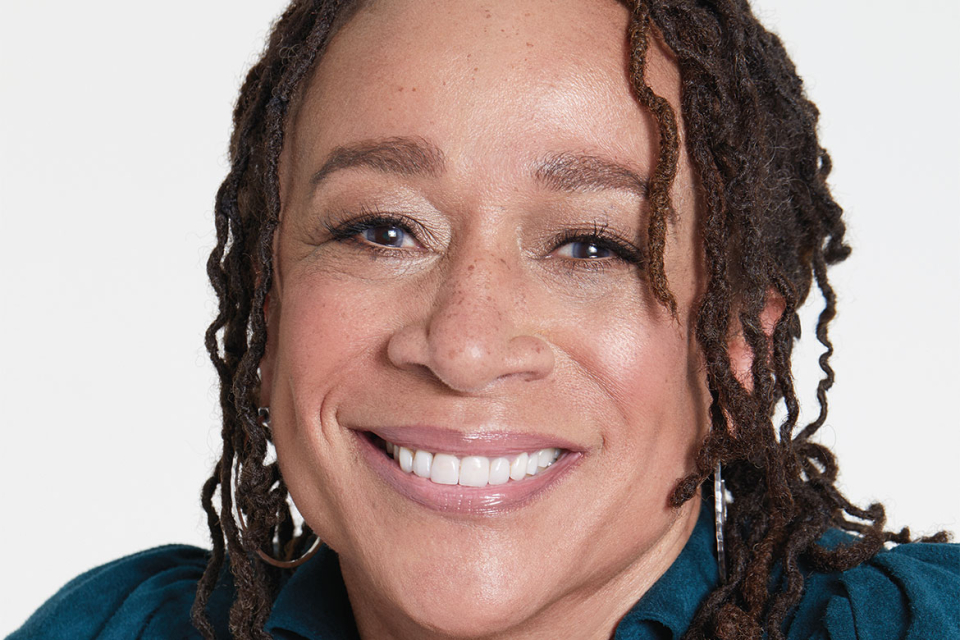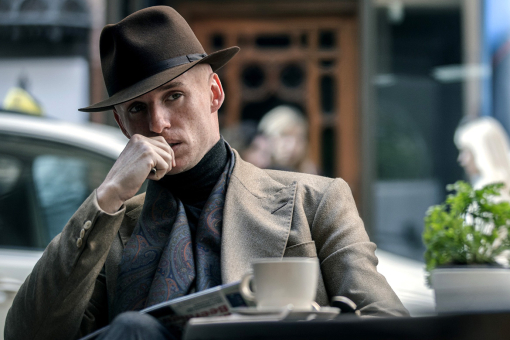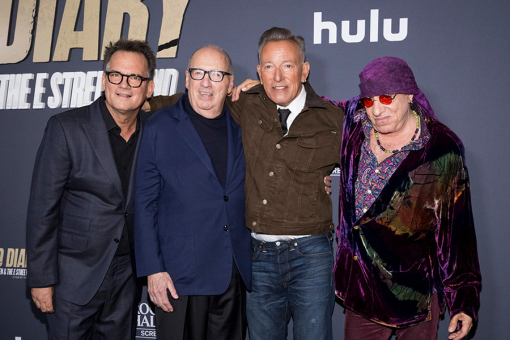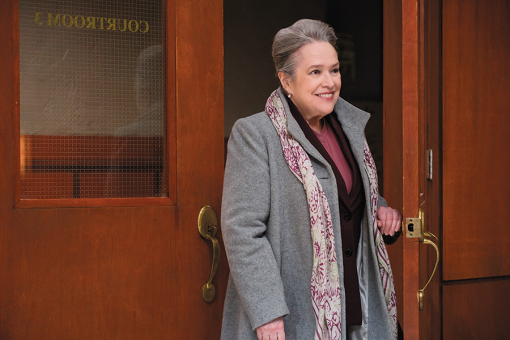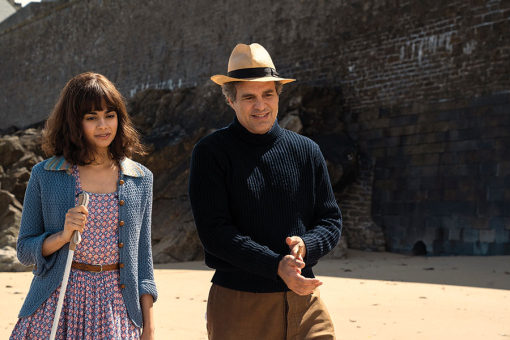When S. Epatha Merkerson steps onto a set or a stage, she is downright bearing witness — whether on Law & Order, in her Emmy-winning turn in Lackawanna Blues or in her current role on Chicago Med.
Her authenticity, say her costars, directors and producers, is no dramatic artifice. Across four decades, Merkerson has brought her truest self to the stage, movies (starting with She's Gotta Have It) and TV (beginning in Pee-wee's Playhouse). Although her range is wide, she's become famous for playing competent, take-charge women who don't suffer fools.
Lieutenant Anita Van Buren ran an NYPD homicide squad. Sharon Goodwin is in charge of patient and medical services at a Chicago hospital.
"The truth is, I think that is what Dick [Wolf] likes about me," Merkerson says. "With television, that is what I tend to play. I tend to play the boss, the best friend, the person with the calm demeanor, but who will then stop the nonsense. On stage, I have the opportunity to show more vulnerability."
Law & Order put Merkerson into the record books as the African-American actress with the longest-running TV role. Her Van Buren was always sensible, ready to take on any macho cop, and unflappable in the face of criminals (until her sons were threatened). Merkerson brings those same qualities to Chicago Med, where Goodwin is a voice of reason when patients or doctors lose their way.
"There are similarities," Merkerson says of these two characters — both from NBC dramas — whom she has played for a total of 22 years. "They were written that way, and they were specifically written with me in mind, especially this one. The only difference is this time, I get to wear my own hair."
Her partnership with Wolf began when Merkerson, like legions of New York–based actors, landed a guest shot on Law & Order. Her performance as a distraught mother whose baby is fatally shot landed her a lead role two years later. In 1993 she became the boss of the homicide detectives, a role she would play for 17 seasons.
Merkerson also appeared in nine episodes of Mann & Machine and one of South Beach. Counting her five seasons of Chicago Med, Merkerson has done 516 episodes of Dick Wolf–produced television.
"Epatha has been employed by me continuously since 1993, when she joined the cast of Law & Order fulltime," Wolf says. "As she has proven on both Law & Order and Chicago Med, she is capable of projecting strength and empathy at the same time. She is one of the most dependable actors I've worked with over the years.
"She has that wonderful, unerring ability to tell the truth in every scene she's in and loses herself completely in every role she plays. Not to mention the fact that she is actually, in real life, when there are no cameras around, a close friend.
"I created the role of Sharon Goodwin for Epatha," Wolf continues. "I called her and said, 'Do you want to go back to work?' 'Not really,' she said. 'What is it?' The rest is very satisfying history."
Goodwin, a character who has also been on Chicago Fire and Chicago P.D., is a nurse who became an administrator. And she keeps learning.
Merkerson had only to look to her 93-year-old mother, Ann, for inspiration. As the actress proudly points out, her mother enrolled in a four-year college at age 72 to learn American Sign Language. At 85, she went skydiving. All this after raising five children on her own, all of whom graduated from college.
"Epatha was a little bossy," says sister Linda Merkerson, a retired teacher who looks and sounds like her famous youngest sister. "We all thought she was my mom's favorite; babies are usually, anyway. We have always been very, very close."
"She is the only person I know personally who is doing exactly what she always said she wanted to do," adds her brother, Zephry Merkerson. He recalls watching the film Imitation of Life with her, "and both of us cried. Then we ran around the house, acting out the parts."
After high school in Detroit, Merkerson earned a BFA in acting at Wayne State University. During college, she worked at a pizzeria, where the owner gave her a sewing machine. Merkerson has spent much of this year's lockdown making masks and a quilt.
During a long Zoom call, she speaks from her worktable in the Seattle home she shares with her beau of three years, Steven Williams, director of audio production at public radio station KUOW. Merkerson also has homes in Chicago and Harlem.
When she first arrived in New York, Merkerson vowed to earn a living as an actress. Apart from two months at Simon & Schuster's reception desk, and working the midnight shift at an answering service, she kept that promise.
By the time her eventual Law & Order costar Jesse L. Martin made his way to New York, he had the same idea. He wanted to meet her because he so respected her work in the Negro Ensemble Company, the New York–based theater group.
"I already knew Epatha's name — pronounced E-pay-tha," he says from his under-construction home near Vancouver. "People still say her name wrong. That just ain't right! I have yet to be on camera with anybody like her." Like so many of her colleagues, Martin homes in on Merkerson's authenticity.
"Epatha is the living example of that on stage, on camera and in life," he says. "That is why she is such a great person and such a great actor."
She has also been a cultural ambassador, introducing him to the work of artists of color and taking him around Harlem, visiting restaurants and befriending chefs. Wherever she goes, people stop her. They feel as if they know her. Everyone seems to want a photo or an autograph. Even in blasé Manhattan, she can be stopped three times just crossing the street.
Merkerson is always gracious, too, even if she's not in the mood. She cites advice from her late Law & Order costar Jerry Orbach. They were at lunch, and he was putting a fork in his mouth when a fan interrupted. Afterward, Merkerson asked Orbach why he'd engaged with the stranger while eating.
"Kid, they're the ones that keep us eating," he quipped in reply.
Another costar from those days remembers meeting the cast, which had already bonded, and how Merkerson hilariously put him at ease.
"My day one on Law & Order was in a hotel conference room," Benjamin Bratt recounts. "Dick Wolf, his writing team, and Jerry and Epatha were assembled to discuss our characters and their relationships."
Wolf explained that Bratt's character, Detective Rey Curtis, was being transferred to the 27th precinct because his former boss had sexually harassed him. Merkerson didn't miss a beat. "'Damn, I'd sexually harass him, too. That's a pretty mutha-----,'" Bratt recalls her saying. "The room fell out, dead. We laughed our asses off, and of course, I fell in love with her immediately."
Merkerson could give her pal Samuel L. Jackson a run on his signature curse. And she is funny. She pranked late Law & Order costar Dennis Farina by making hundreds of copies of her headshot in different sizes and plastering his dressing room with her face: on the ceiling, in the pockets of his clothes, on water bottles in the fridge.
She laughs as she tells this story, and colleagues never fail to mention how much they laugh with her.
"We are supposed to be the mature, experienced actors setting a good example" on the set of Chicago Med, Oliver Platt says. "And we are much more likely to be corpsing. We just mess around, and we can't help it." However goofy she gets between takes, when they're taping, Merkerson is all business. And she sets the tone on set.
"As number one on the call sheet, you can kill the vibe on set or make it magical," says Chicago Med's Torrey DeVitto, who calls her Big Sis. "And she makes it magical."
"She can say things that may be on everyone's mind, but no one wants to say," adds Chicago Med's Yaya DaCosta. "She is fearless and graceful at the same time, and she can throw in a joke here and there that brings everyone together. Everybody knows her energy and boldness."
DaCosta noticed Merkerson's solid relationship with Wolf and other executives. It's a connection she has fostered over the years. Merkerson says she speaks up because she well remembers being the sole person of color on Law & Order.
"That has changed," she says. "You look at Med, and it is a multiracial show, and it should be. Still, we need to see more happen. The only way to see a difference is if you educate and make it a part of production. We are in the middle of a sea change, and it really is happening."
In the arts, change results from having Black voices in the process from the beginning, she notes, citing writer-producers Ava DuVernay, Lena Waithe and Issa Rae. "I used to be told that there weren't any good Black writers, and when you hear that, you know better," she says. "I think that now — to use a phrase the kids use — folks are woke."
Merkerson grows quiet for a moment. "Maybe I am in a vulnerable place now, but the death of George Floyd was really, really difficult," she says. "And what is going on in the world now, it feels like the Earth is in some adjustment period. This is not just happening in Minnesota or New York; this is happening all over the world.
"The pandemic is all over the world. The racial disparities are being dealt with and protested all over the world, and it feels like the Earth is teetering on some human adjustment. What it all means, I don't know."
She supports the protestors but can't take to the streets, noting that at 67, with diabetes and high blood pressure, "I'm staying sheltered in. But I find ways to be helpful. I have been lucky to work on these shows. It has afforded me an opportunity to have a nice life, so I donate. All of these things mean something. I am fascinated to see where we wind up."
Her one fervent wish: "After they finish demonstrating, I want to see them walk to the voting booth." Merkerson recalls that her mother had to leave home to attend high school because no schools in her neighborhood accepted Blacks. And she has not forgotten (or forgiven) the high school teacher who took away her part as Cleopatra and gave it to a tall, exotic- looking classmate.
Merkerson was never cast in the mainstage productions in college. Yet she persisted, with the help of mentors like Barbara Montgomery (Amen, Married People) and Mary Alice (I'll Fly Away, A Different World) as mentors. She passes it on when actors ask for her help.
Merkerson has logged thousands of hours on stage and been nominated for two Tonys. Considering she has been in only two Broadway shows (though she understudied once early on), that's a terrific record.
In Come Back, Little Sheba, Merkerson played an emotionally abused woman, a role for which Shirley Booth won a Tony and an Oscar. When director Michael Pressman wanted to revive it on Broadway in 2008, he instantly thought of Merkerson.
Having directed her in Law & Order and Chicago Med, where he is also an executive producer, Pressman wrote Merkerson a "very lengthy email explaining why she would be perfect for this. I had gotten the estate to approve the idea," he says, "and asked, would she be interested? She wrote back in large bold print: 'Hell, yeah!'"
Pressman recalls a long, intensive rehearsal process for this quiet play about a miserable marriage. When they emerged, Merkerson was transformed, he says, into "this vulnerable, lonely, optimistic woman against the odds of a terribly abusive relationship. She was able to find the love deep inside.
"She embraced all these qualities in her character, and it became kind of seamless. The emotional connection to the loss of her innocence, and the loss of her dreams, are all embodied in that little dog, Sheba."
Merkerson also hit those highs and lows as Nanny in HBO's Lackawanna Blues. That vulnerability is bolstered by a steel core so strong that she seems impervious to the forces that fell others. Jimmy Smits, who costarred in the 2005 film, refers to Merkerson as a touchstone and a rock.
They'd known each other from New York theater, and he recalls her as a serious stage actress. "I remember seeing her in The Piano Lesson with Charlie Dutton and Rocky [Carroll]," Smits says of the 1990 Pulitzer-winning drama by August Wilson. "She is a force-of-nature actor."
Merkerson's goal was to make it to Broadway before she turned 40. She was 38 when she took bows in Wilson's play. It changed the course of her career. Not long after that production, Wolf hired her for the first time. "Dick Wolf knew she was not a diamond in the rough," Smits says. "Just a diamond."
During her years on the cop-and-court show, her appearance changed. "You could literally see my ass grow every season," Merkerson says.
After quitting a three-pack-a-day habit in 1994, she went from a size six to a 14. At 50, she was diagnosed as diabetic. Fearful of following relatives who'd gone blind and lost limbs to the disease, Merkerson now watches what she eats. She's lost the weight and become much healthier.
Though she has no goal role she's always longed to play, Merkerson enjoys her schedule of a series, then a play, on alternating hiatuses. Last year she did A Raisin in the Sun at the Williamstown Theatre Festival in Massachusetts.
She admits that when approached about revisiting Lorraine Hansberry's groundbreaking work, she thought she'd play Ruth again. Nope, the offer was for Lena, the matriarch. "I thought, 'Oh yeah, I am that old!'" she says, laughing hard. "Miss Thing, what makes you think you are young enough to play Miss Ruth? You played Ruth."
While she has no plans for the next play, Merkerson trusts the right one will come along. In the meantime, TV production will resume at some point, and she will return to the set. Colleagues will seek her guidance as an actor and a cool colleague.
Until then — and likely, beyond — she chooses "to live your life as an example for those who come after you. I never wanted children," she says, "never wanted to be a mother. I never set out to be a role model, but I guess there are worse things to be."
Thi article originally appeared in emmy magazine, Issue No. 9, 2020

